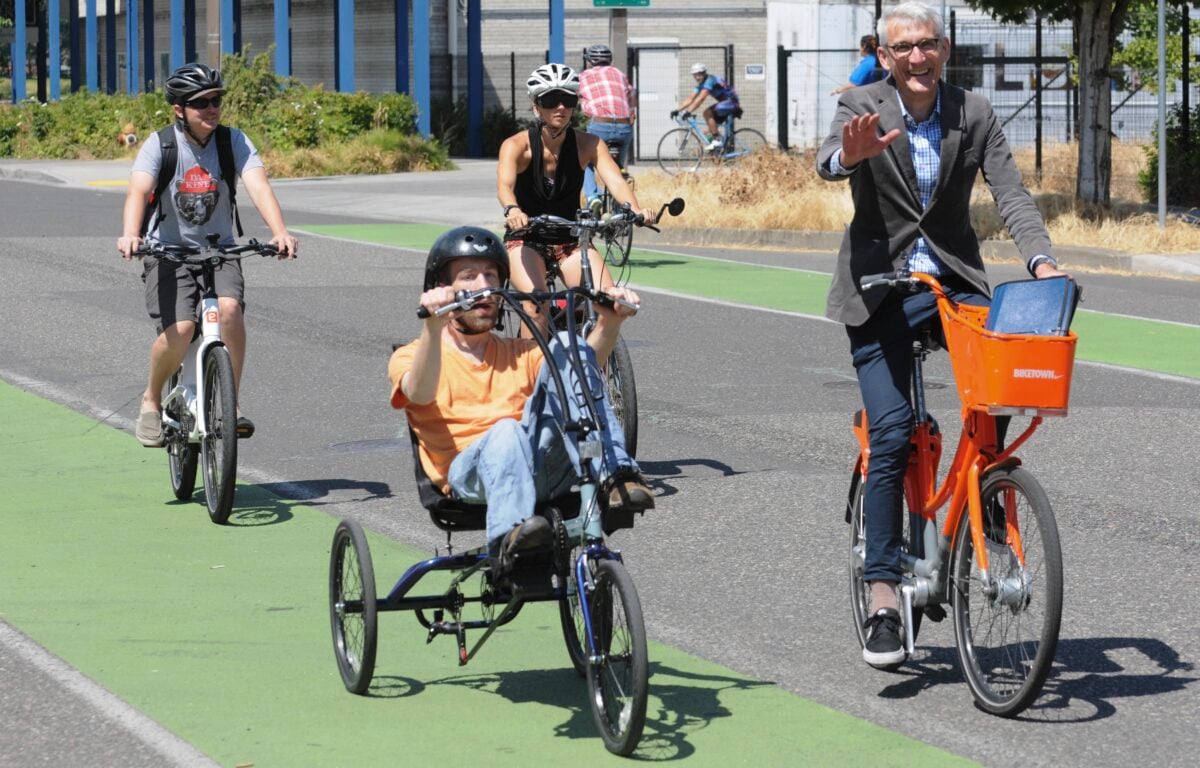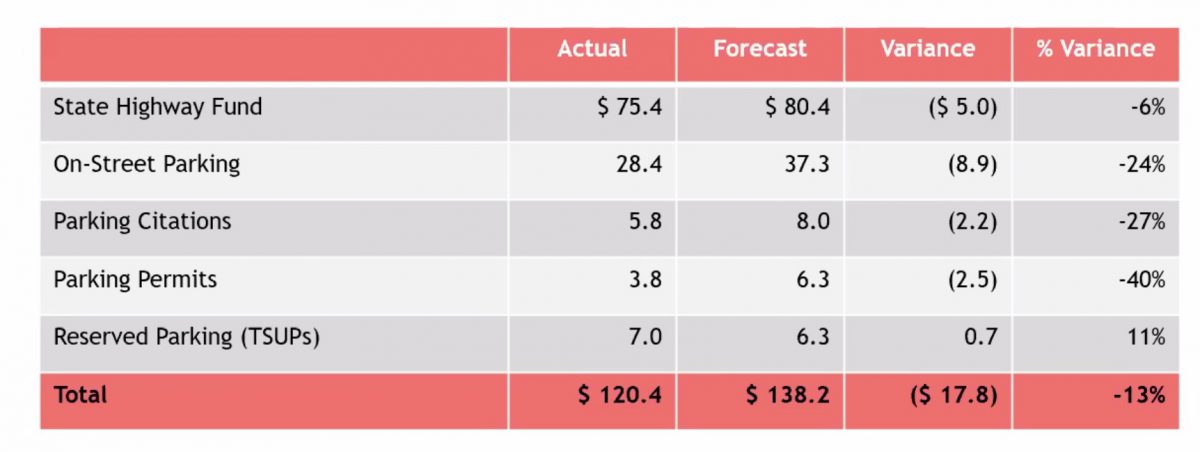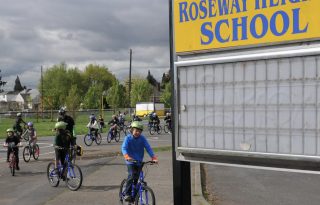
(Photos: Jonathan Maus/BikePortland)
“I’m just speaking from a parent’s perspective and how hard it is to to get certain things done for schools; and to see more cuts even proposed… it’s frustrating.”
— Meesa Long, PBOT budget committee member
Something’s got to go in Portland’s transportation budget next year and the decision about what gets cut is right around the corner.
There are many challenging structural issues with how transportation is funded in the City of Portland and impacts from the Covid-19 pandemic have brought them into even sharper contrast.
One of the troubling quirks in PBOT’s budget is how a sizable portion of their discretionary revenue comes from people driving and parking in the central city — a behavior in direct opposition to many citywide goals. In a typical year parking-related fees from meters, permits, and citations make up about $50 million or one-third of the bureau’s total discretionary revenue. While traffic has inched back up to pre-Covid levels, parking still lags way behind and the hit to PBOT’s budget has been severe.
Advertisement

(Source: PBOT)
PBOT says parking revenue was down 90% in April and remains about 55% below forecasted levels. And the outlook isn’t great either. PBOT staff say it could take years to return to baseline revenue levels — and the baseline itself might have shifted for good.
Combined with declines in revenue expected from state and local gas taxes (the other source of funding not dedicated to specific uses), PBOT faces the daunting task of shaving 10% from its “general transportation revenue” (GTR) for the 2021-2022 fiscal year (July 1 to June 30). With help unlikely to come from the city’s general fund (which only accounts for a paltry 0.22% of PBOT’s budget), this means PBOT will have to trim from popular programs and services that are already pretty lean.

Last night the PBOT Bureau Budget Advisory Committee (BBAC) began the hard work of prioritizing where the cuts will come from. Everything is on the table, including cherished projects in the Active Transportation & Safety program. At the meeting, members were given a presentation from PBOT staff that included a slide proposing potential cuts to: the Biketown bike share system ($35,000); Biketown for All ($50,000); Safe Routes to School ($65,000); Sunday Parkways ($40,000); and the Transportation Wallet, a service that offers discounted bus, bike, scooter and streetcar fares ($20,000).
Other possible cuts could include: a $900,000 cut to the sidewalk budget, a $400,000 cut to maintenance of street lights and signals, and a $400,000 cut to street cleaning just to name a few.
Committee member Meesa Long was surprised to see Safe Routes to School on the list. “I’m a teacher and I work and live in a neighborhood that has no sidewalks and Safe Routes to School is a really big deal for me and my neighbors and my colleagues… I’m not really sure what they would cut,” she said. In a typical budget cycle, making it safer to get to and from school would be an untouchable priority — but with no return to schools in sight, some people think it’s less important.
When a PBOT staffer clarified that the Safe Routes to School cut wouldn’t impact street projects but would come out of an in-school safety education program, the Long was still concerned. “I’m just speaking from a parent’s perspective and how hard it is to to get certain things done for schools; and to see more cuts even proposed… it’s frustrating.”
Advertisement
When it comes to Sunday Parkways, a different committee member had a similar point of confusion. “Are those [events] even happening in 2021?” he asked.
Committee member Sarah Iannarone, who received 41% of the citywide vote in the recent Portland mayoral election and represents the Bicycle Advisory Committee, made a strong plea to avoid cuts to bike share and transit discounts. “I’m having a hard time looking at a $20,000 cut to the Transportation Wallet, which we fought so hard to get in place, with $300,000 in take-out [food] for police at protests this summer alone — that’s more than all the cuts proposed to Active Transportation combined [$210,000].”
“We should be fighting against cuts like this because we want to be growing these programs. We want to be growing access for people with disabilities into cycling, not cutting into them.””
— Sarah Iannarone, committee member
“I feel like $20,000 from the Transportation Wallet is robbing us of something that is a rounding error in the whole city budget,” Iannarone continued. “and we should be fighting against cuts like this because we want to be growing these programs. We want to be growing access for people with disabilities into cycling, not cutting into them.”

The BBAC’s task over the next few weeks will be draft a letter with recommendations that will be sent to PBOT leadership and city council members in January. Adding to the challenge of this year’s budget process is that Mayor Ted Wheeler has not yet appointed a commissioner to oversee PBOT. In lieu of political leadership, the BBAC must lean on PBOT staff and their three priorities of safety, equity, and climate.
PBOT Director Chris Warner is leading the process. He shared with me earlier today that the agency is, “Facing the need to make hard decisions.” He said their budget decisions will be guided by minimizing impacts to strategic and equity goals. Budget cuts hold particular peril for equity initiatives because recent hires (that reflect a commitment to employ Black, Indigenous and people of color) are often the first go. There’s also a concern that service cuts hit hardest to those who need them most. At the September Budget Advisory Committee meeting, Active Transportation & Safety Program Manager Catherine Ciarlo pointed out that, “It takes more work to deliver programs to our our traditionally underserved communities than it does to deliver programs to our usual suspects. And more work translates to more money.”
The BBAC has its work cut out this year. Director Warner will need their input. “We’ve asked them to give us their advice about where they would make cuts and where cuts would not be tolerable,” he shared today. “This is a difficult process and we value the thoughtful insights we have received from our committee members thus far.”
Stay tuned for more coverage and opportunities to weigh in on the budget process.
— Jonathan Maus: (503) 706-8804, @jonathan_maus on Twitter and jonathan@bikeportland.org
— Get our headlines delivered to your inbox.
— Support this independent community media outlet with a one-time contribution or monthly subscription.


